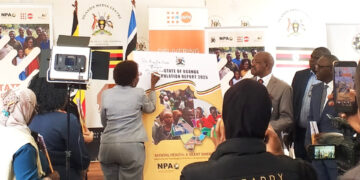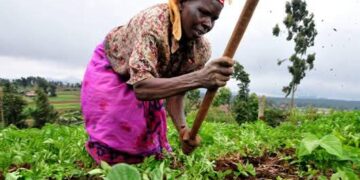Study guide: By Mugisha Charles K , AN INSIGHT INTO THE DRAMATIC ELEMENTS OF THE PLAY AMINATA BY FRANCIS IMBUGA
Imbuga examines gender issues with great sensitivity in his plays. Written specially for the Second World Women’s Conference in Nairobi in 1985.
The play Aminata depicts the discrimination against women by a male-dominated system by presenting the struggles of a brilliant and tenacious lawyer against traditional beliefs that men use to disinherit women.
The play Aminata was written by Francis Imbuga (1947_2012) a Kenyan playwright.
Setting
It is set in Kenya.
The play is centered on Aminata, a daughter to late pastor Ngoya, before his death, Ngoya writes a Will in which he lawfully makes Aminata the heir to his piece of land.
This is met with a lot of opposition from many especially Jumba, Ngoya’s brother and obviously Aminata’s uncle. Jumba claims that Aminata is a woman and traditionally women are not allowed to inherit land.
Aminata is determined to own the land as Jumba teams up with Ababio, her biological brother to make her efforts fruitless.
In pastor Ngoya’s Will there is another wish, he asks his family not to cement his grave.
After his death, Jumba together with Ababio cement Late Ngoya’s grave thinking that they are locking all his aims never to surface in Membe. For instance, before his death, pastor Ngoya encourages family planning, fights for women rights.
Jumba is also a leader of the Elders (headman of Membe) who makes decisions for Membe. He uses his influence to deter Aminata from inheriting the piece of land and wants it given to Ababio, a drunkard.
In the end, Jumba is confronted by late Ngoya’s ghost, he gives up his leadership to his wife, Rosina and accepts Aminata to inherit land. Ababio commits suicide in protest of the event.
THEMES
The play has various themes as shown below:
“Themes refer to the main issues and concerns that a writer intends to communicate to his audience. They are issues affecting our contemporary society and the playwright is part and parcel of the society he writes about. FrancisImbuga in his play, ‘Aminata’ tries to mirror and highlight so many issues of societal concern affecting Membe. These themes include poverty, empowerment of women,tradition, change, cultural conflict among others as discussed in the following paragraphs.
Women empowerment or Women emancipation
The Case of Aminata, Francis Imbuga is among writers in Kenya and Africa in particular who through their creative works, the writers have added their voice on the on-going discourses on gender and power and their manifestations in society. Aminata, Imbuga’s play, explores the politics of power and gender as played out in the fictional community of Membe.
The play ‘Aminata’ is all about the empowerment of women, no wonder the title ‘Aminata’. Francis Imbuga has tried to uphold the dignity of women by presenting them as capable and wise people, for example Aminata and MamaRosina.
The theme of women empowerment or Women emancipation takes centre stage in Francis imbuga’s play of Aminata. Since time immemorial women have suffered the place of beasts of burden, victims of suppression objects of pleasure and far looked down upon in our societies.
But in the play, the resurrection of women into the stools of rule has given them a different look for example, MamaRosina takes over from Jumba to become the first woman to sit on the stool of rule. In this way, the Membe society has empowered women so that the voice of Membe can be heard through them. Secondly, women have been empowered through education. Aminata has gone to school and excels well as a lawyer.
Education enlightens Aminata to know her rights and work hard to protect them. For instance, when her late father, pastor Ngoya writes a will to reward Aminata a piece of land she fights for it amid objections from her uncle Jumba and her brother, Ababio.
Women for example Aminata and Rosina throughout the play struggle to emancipate themselves from their archaic culture that makes them subordinate to their men.
Women for example Aminata and Rosina throughout the play struggle to emancipate themselves from their archaic culture that makes them subordinate to their men.
Aminata eats chicken and its soup at an event held by her father to show women that they are supposed to eat chicken contrary to their culture. she is a lawyer and not a house wife. Rosina becomes a head of Membe the very first female leader in the history of Membe breaking Kesia’s argument obviously because she is indoctrinated to believe so by the culture she is in that “the stool of Membe is not meant for female buttocks”
The confrontation between Jumba and Aminata forms the basis of discussion since it is through it that we are able to visualise how the gendered self in Aminata engages with power structures in the society.
In demanding to know from her uncle, Jumba, what is wrong with her inheriting property such as land, Aminata seems not only to speak for herself but also for her fellow women who are oppressed by the male dominated power structure in the society. Women are seen as victims of this oppressive structure and are in a constant struggle for equality with men. In Membe’s power structure, they have been reduced to either conform or resist. Aminata opts for resistance as the only means of attaining freedom and self-definition as a woman.
Domestic violence. Ababio beats up his wife which explains why they separate.
Education
In addition to this through education Aminata becomes financially empowered. That is she takes on a good job with a better pay. Using her money, Aminata is able to improve her people’s living standards. Firstly, she brings piped water into the village, starts a tailoring business for her uncle Jumba, pays school fees for ababio’s children, takes care of her father and hires a choreographer for the children’s choir.
Through these achievements,Aminata redeems further the reputation, gains fame and becomes very popular and beats the men folk in Membe. For example, Ababio and Agege cannot be matched with Aminata. That’s why Agege admits by saying that Aminata is more equal than Ababio. Aminata gets supported by the headmen of Membe including the oldest man in Membe, Abadi.
The theme of education comes out as a very important theme. The transformation of society largely relies on education. Education brings change by opening up people’s mind to change their perception and shade off their prejudices, misconceptions and misunderstandings that they have about life. For example, the misconception that women cannot rule or inherit property or taste chicken’s soup among others…”
Male chauvinism
This is portrayed through Jumba who constantly ensures that Aminata doesn’t inherit land since she is female. During arguments with Rosina Jumba constantly reminds her how he is the head of the family. Ababio, Aminata’s brother believes that men are superior and way above women.
Gender disparity pervades many African societies, the Membe society being no exception. Many of these societies are grounded on traditional patriarchal systems of governance. The place of women in many of these African societies for a long time is culturally defined, therefore restricting women to domestic chores and specified places of operation, commonly known as domestic spaces. However, with the advent of modernity, culturally defined roles and places for women are sharply contested. Gender crusaders in Africa and the world over have upped the fight against the discrimination of women as they agitate gender equality. Like men, women need and deserve to be treated as decent human beings, to be listened to and to inherit property.
It is through Aminata, therefore, that the playwright deconstructs the patriarchal wisdom that women are only meant for domestic chores
African traditional culture vs Modernity.
Aminata is determined to fight for her full rights regardless of whatever it takes. She cannot be deterred by the traditional practices that her uncle Jumba keeps citing to deny her the land. She even wonders why Jumba cannot embrace change which some of the elders have seen instead of clinging to tradition. She says;
“That is precisely why I am asking, no, demanding that my Uncle and his circle of elders tell me what is wrong with being a woman. I want them to tell me what is wrong with me!”(39).
This shows that Aminata is ready and set to engage with the patriarch “to the bitter end.” However, Jumba remains adamant that Aminata as a woman does not deserve to inherit any piece of land for tradition demands so. He views Aminata’s attempt to acquireland as a form of subverting traditional cultural codes and as an indirect invasion of the male space.
As uncle and niece “lock up horns” on the issue of obeying a dead man’s will, it is clear that the conflict is not between the two of them but is one that is informed by irreconcilable ideological differences between tradition and modernity (74).
Aminata is determined to fight for her full rights regardless of whatever it takes. She cannot be deterred by the traditional practices that her uncle Jumba keeps citing to deny her the land. She even wonders why Jumba cannot embrace change which some of the elders have seen instead of clinging to tradition. She says;
“That is precisely why I am asking, no, demanding that my Uncle and his circle of elders tell me what is wrong with being a woman. I want them to tell me what is wrong with me!”(39).
This shows that Aminata is ready and set to engage with the patriarch “to the bitter end.” However, Jumba remains adamant that Aminata as a woman does not deserve to inherit any piece of land for tradition demands so. He views Aminata’s attempt to acquireland as a form of subverting traditional cultural codes and as an indirect invasion of the male space.
As uncle and niece “lock up horns” on the issue of obeying a dead man’s will, it is clear that the conflict is not between the two of them but is one that is informed by irreconcilable ideological differences between tradition and modernity (74).
The play puts Jumba, the village headman against Aminata, his niece and his late brother pastor Ngoya’s daughter. Jumba has refused to honour and respect the wishes of Pastor Ngoya who in his will had bequeathed his three acre piece of land to Aminata and had stated that his grave should not be cemented (Aminata pg 4). Central to our discussion is how Aminata, the gendered self, engages Jumba, the embodiment and custodian of tradition, in ensuring that Pastor Ngoya’s wishes are honoured and fulfilled. Ngoya’s act of bequeathing his land to Aminata is an affront to tradition in this society where women are not entitled to any form of inheritance. Therefore, Jumba, the one charged with the responsibility of ensuring that tradition is followed to the letter as the village headman, refuses to let Aminata inherit the piece of land because it Jumba finds himself at the crossroads of obeying tradition or fulfilling Ngoya’s wishes. He feels that if he disregards the wishes of his late brother, he is also in danger of being punished for the community believes that ghosts of the dead person will pursue the one who fails to follow the wishes. Hot on his heels is Aminata – the beneficiary of Ngoya’s wishes. Jumba finds it difficult to deal with Aminata as he admits
“That woman is stubborn as a he-goat on heat” (15).
As African traditionalists like Kesia and Mulemi’s father believe that a man should marry as many wives as he wishes so as to have many children. The modernists like late pastor Ngoya and Mulemi, Aminata’s husband believe that a man should marry one wife and beget at least two children no wonder, he constantly researches on ..family planning.
The idea of contraception and having small familiesis also brought out in the play. As with most women’s rights advocacy, access to contraception is a key element. Jumba (the village headman) has a flashback whereby Pastor Ngoya tells his congregation:
“I agree with Reverend Abu-Steiner that every fourth child in every family should be seen as an extra mouth. A mouth to feed, a mouth to stop crying, and a mouth to give medicine to.”
There is the idea that people should not have more than three children: that a fourth child is not a person but a mere burden referred to as a ‘mouth’. On the other hand we have Mulemi who has undergone a vasectomy (never mind he is researching on the possibility of reversing his vasectomy) touting that a smaller family guarantees children’s well-being and allows women to concentrate with their careers and for Aminata’s case, to help other and improve their lives. Sure, but why not make the work place more female friendly such that women are allowed to progress in their careers without being penalised for having families?
The issue here is not that children should not be spaced. It’s that having three children is put across as the ideal and that a fourth child is seen as a burden (just a mouth) as if people do not contribute anything to society. That extra mouth to feed might as well be a future president or the one to discover the cure for a currently incurable disease.
The theme of Christianity;
that its not traditionally ‘cultural’. But if you dont want to talk about culture as ‘traditional’ (if you know what I mean), then you could say it is a reflection of the changing society and thus aids in preservation of cultural authenticity.
Also, you could talk about the use of local imagery like ‘guava’
When Ababio does not pay Ndururu what he owes him, Ndururu exclaims: “I knew it. You can’t get blood from a guava, can you?” thus implying that Ababio is not paying him as he does not have money. Such idiomatic phrases help maintain cultural authenticity as the idioms are derived from local imagery that is common to the villagers.
Also, the fact that Imbuga calls the authorial body as ‘stool of rule’ while in English we say ‘seat of power’. This could help prove the fact that if Imbuga was to use English phrases, it would deter cultural authenticity, thus though it may sound awkward to the normal English speaker, it is an aspect of culture as African phraseology is used.
Gender discrimination.
Whilst admonishing the women of Membe, Jumba asks: “Tell me, on that day when women tore at each other’s breasts in their fight for chicken’s heads, who was it who first tasted the soup?”
One would wonder: why are women being ridiculed for eating chicken? Unless, the reader is aware that African tradition demanded that only men can eat chicken, among other prestigious foods, which reflects an aspect of traditional culture – gender – discrimination…
Jumba condemns Nuhu when he supplicates: “Forgive us” by saying “Enough of this female talk!” Rosina refers to Aminata as “the weaker sex.” This too reflects traditional African society’s gender discrimination and unless one knows of it, he might find it awkward.
Characterisation
Aminata is a highly educated, brilliant, aggressive and assertive lawyer
Aware of the resistance that she will receive from the patriarchs, Imbuga portrays Aminata as a highly educated, brilliant, aggressive and assertive lawyer with a mind of her own. Her knowledge, especially in law, plays a significant role in her battle for the land as she points out;
“In law, their defence is totally helpless. Some of the more enlightened elders know this. But the rest led by Jumba, are totally impervious to reason” (36).
By juxtaposing Aminata’s wide knowledge to that of Jumba, Imbuga foregrounds the fact that knowledge is important in the emancipation of the gendered self. The playwright is conscious of the fact that knowledge gained through avenues such as education and professionalism is one of the ways of empowering the oppressed in the society. Knowledge, as Couze Venn points out in The Postcolonial Challenge: Towards Alternative Worlds, “gives a voice to those not allowed to speak in the public sphere” (118). Aminata’s wide knowledge enables her determine when to talk or not as is the case when she was in a meeting with Membe elders regarding her inheritance thus:
Nothing. In fact some of them were quite surprised of my silence… From the anxiety on their faces patriarchs.They were expecting a bitter confrontation between me, Ababio and my uncle. But they were wrong. What would I gain from such a confrontation? Absolutely nothing. So I just sat there and played it by the ear. (36-37) From the above excerpt, Aminata is shown as one able to read the mood and make an informed opinion on how to react. Therefore, it is clear that knowledge empowers the gendered self and offers her an array of ways of engaging with the patriarchs
She is an agent of social transformation
Aminata’s development record speaks volumes. The playwright
depicts her as the epitome of social transformation through the various projects that she initiates such as bringing piped water, campaigning against cultural practices which discriminate against women, family planning and paying school fees for her brother’s children. All these roles she ably executes and with ease. Her aunt Kezia, though critical of her failure to give birth to many children, acknowledges this when she says:
We do not belittle what she has done for Membe and for us, no. All we want is the woman in her. Is she to invest all her goodness in only two children? That, son of my brother, is our worry. Every time we switch on our wireless, it is Aminata’s name we hear. What happened of yours? (33)
Therefore, through her development projects, Aminata has not only endeared herself to the people but (re)configured herself in society. In her struggle with the patriarchs, she has succeeded in moving and showing that the gendered self is capable of actively taking part in the society’s social transformation processes.Aminata, brings change to the people through initiating various development projects and
her campaign for human rights. The people are able to see, feel and live her vision. Through her, the writer
shows that women are capable of bringing the much needed change in society. In the play, the author further
shows that women, unlike their male counterparts, are conscious and concerned with the well being of the society and its development.
Aminata is a determined character.
Aminata is portrayed as a character who has not passively succumbed to oppression but is constantly involved in contesting, subverting and re-working the oppressive power structure in her society.Aminata even shows her resolve to change society through initiation of projects such as bringing piped water, campaigning against cultural practices which discriminate against women, family planning and paying school fees for her brother’s children.
She doesn’t easily give up
TECHNIQUES
Proverbs
There are many proverbs you might want to expound upon; like “Nothing but blood washes away the tears of an offended spirit.”
“sweetness of sugar is not in its colour” (its connected to “don’t judge a book by its cover’ because Mama Rosina uses it when descibing Pastor Ngoya)
Symbolism
There is use of different symbolic words in African society, like how glow – worm is looked at. Nuhu says about Pastor Ngoya “He was Membe’s glow-worm in gone days.” As a glow worm glows in the dark hence is distinct and provides light, thus he means that Pastor Ngoya provided light (guidance) in the darkness (of ignorance).
Use of flashbacks
Such as the
Irony
Biblical allusion
“That woman is stubborn as a he-goat on heat” (15).
As African traditionalists like Kesia and Mulemi’s father believe that a man should marry as many wives as he wishes so as to have many children. The modernists like late pastor Ngoya and Mulemi, Aminata’s husband believe that a man should marry one wife and beget at least two children no wonder, he constantly researches on ..family planning.
The idea of contraception and having small familiesis also brought out in the play. As with most women’s rights advocacy, access to contraception is a key element. Jumba (the village headman) has a flashback whereby Pastor Ngoya tells his congregation:
“I agree with Reverend Abu-Steiner that every fourth child in every family should be seen as an extra mouth. A mouth to feed, a mouth to stop crying, and a mouth to give medicine to.”
There is the idea that people should not have more than three children: that a fourth child is not a person but a mere burden referred to as a ‘mouth’. On the other hand we have Mulemi who has undergone a vasectomy (never mind he is researching on the possibility of reversing his vasectomy) touting that a smaller family guarantees children’s well-being and allows women to concentrate with their careers and for Aminata’s case, to help other and improve their lives. Sure, but why not make the work place more female friendly such that women are allowed to progress in their careers without being penalised for having families?
The issue here is not that children should not be spaced. It’s that having three children is put across as the ideal and that a fourth child is seen as a burden (just a mouth) as if people do not contribute anything to society. That extra mouth to feed might as well be a future president or the one to discover the cure for a currently incurable disease.
The theme of Christianity;
that its not traditionally ‘cultural’. But if you dont want to talk about culture as ‘traditional’ (if you know what I mean), then you could say it is a reflection of the changing society and thus aids in preservation of cultural authenticity.
Also, you could talk about the use of local imagery like ‘guava’
When Ababio does not pay Ndururu what he owes him, Ndururu exclaims: “I knew it. You can’t get blood from a guava, can you?” thus implying that Ababio is not paying him as he does not have money. Such idiomatic phrases help maintain cultural authenticity as the idioms are derived from local imagery that is common to the villagers.
Also, the fact that Imbuga calls the authorial body as ‘stool of rule’ while in English we say ‘seat of power’. This could help prove the fact that if Imbuga was to use English phrases, it would deter cultural authenticity, thus though it may sound awkward to the normal English speaker, it is an aspect of culture as African phraseology is used.
Gender discrimination.
Whilst admonishing the women of Membe, Jumba asks: “Tell me, on that day when women tore at each other’s breasts in their fight for chicken’s heads, who was it who first tasted the soup?”
One would wonder: why are women being ridiculed for eating chicken? Unless, the reader is aware that African tradition demanded that only men can eat chicken, among other prestigious foods, which reflects an aspect of traditional culture – gender – discrimination…
Jumba condemns Nuhu when he supplicates: “Forgive us” by saying “Enough of this female talk!” Rosina refers to Aminata as “the weaker sex.” This too reflects traditional African society’s gender discrimination and unless one knows of it, he might find it awkward.
Characterisation
Aminata is a highly educated, brilliant, aggressive and assertive lawyer
Aware of the resistance that she will receive from the patriarchs, Imbuga portrays Aminata as a highly educated, brilliant, aggressive and assertive lawyer with a mind of her own. Her knowledge, especially in law, plays a significant role in her battle for the land as she points out;
“In law, their defence is totally helpless. Some of the more enlightened elders know this. But the rest led by Jumba, are totally impervious to reason” (36).
By juxtaposing Aminata’s wide knowledge to that of Jumba, Imbuga foregrounds the fact that knowledge is important in the emancipation of the gendered self. The playwright is conscious of the fact that knowledge gained through avenues such as education and professionalism is one of the ways of empowering the oppressed in the society. Knowledge, as Couze Venn points out in The Postcolonial Challenge: Towards Alternative Worlds, “gives a voice to those not allowed to speak in the public sphere” (118). Aminata’s wide knowledge enables her determine when to talk or not as is the case when she was in a meeting with Membe elders regarding her inheritance thus:
Nothing. In fact some of them were quite surprised of my silence… From the anxiety on their faces patriarchs.They were expecting a bitter confrontation between me, Ababio and my uncle. But they were wrong. What would I gain from such a confrontation? Absolutely nothing. So I just sat there and played it by the ear. (36-37) From the above excerpt, Aminata is shown as one able to read the mood and make an informed opinion on how to react. Therefore, it is clear that knowledge empowers the gendered self and offers her an array of ways of engaging with the patriarchs
She is an agent of social transformation
Aminata’s development record speaks volumes. The playwright
depicts her as the epitome of social transformation through the various projects that she initiates such as bringing piped water, campaigning against cultural practices which discriminate against women, family planning and paying school fees for her brother’s children. All these roles she ably executes and with ease. Her aunt Kezia, though critical of her failure to give birth to many children, acknowledges this when she says:
We do not belittle what she has done for Membe and for us, no. All we want is the woman in her. Is she to invest all her goodness in only two children? That, son of my brother, is our worry. Every time we switch on our wireless, it is Aminata’s name we hear. What happened of yours? (33)
Therefore, through her development projects, Aminata has not only endeared herself to the people but (re)configured herself in society. In her struggle with the patriarchs, she has succeeded in moving and showing that the gendered self is capable of actively taking part in the society’s social transformation processes.Aminata, brings change to the people through initiating various development projects and
her campaign for human rights. The people are able to see, feel and live her vision. Through her, the writer
shows that women are capable of bringing the much needed change in society. In the play, the author further
shows that women, unlike their male counterparts, are conscious and concerned with the well being of the society and its development.
Aminata is a determined character.
Aminata is portrayed as a character who has not passively succumbed to oppression but is constantly involved in contesting, subverting and re-working the oppressive power structure in her society.Aminata even shows her resolve to change society through initiation of projects such as bringing piped water, campaigning against cultural practices which discriminate against women, family planning and paying school fees for her brother’s children.
She doesn’t easily give up
TECHNIQUES
Proverbs
There are many proverbs you might want to expound upon; like “Nothing but blood washes away the tears of an offended spirit.”
“sweetness of sugar is not in its colour” (its connected to “don’t judge a book by its cover’ because Mama Rosina uses it when descibing Pastor Ngoya)
Symbolism
There is use of different symbolic words in African society, like how glow – worm is looked at. Nuhu says about Pastor Ngoya “He was Membe’s glow-worm in gone days.” As a glow worm glows in the dark hence is distinct and provides light, thus he means that Pastor Ngoya provided light (guidance) in the darkness (of ignorance).
Use of flashbacks
Such as the
Irony
Biblical allusion






































